大学英语 Unit 5
新视野大学英语第二版Unit5
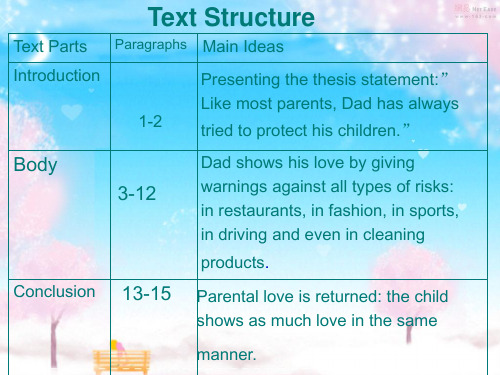
put on 穿上,戴上
I saw him put on his jacket, pick up his case and go out.
我看见他穿上夹克,拎起箱子出去了。
6 Look—it’s too long, even on me. And this material is so heavy that it would pull you down.” 7“I have never heard of anyone being injured by too heavy a coat.” 8 “Do you want to be the first? Just cut it off here,” he said, drawing his hand across his knees.
risks–from careless waiters who might drop hot
coffee onto your head, to employees who didn’t
wash their hands.
父亲告诫我们说,在饭店就餐会面临许多危险—
—粗心的服务员可能会把滚烫的咖啡打翻在你头
to this day: 至今
To this day, Yellow Stone Park has remained
a prized possession to the American people. 黄石公园至今仍是美国人民的宝贵财产。
Watch your eyes:当心眼睛
out,take care , be careful in 当心 留意
Para. 3-4
reБайду номын сангаасember doing:记得曾做过某事
大学英语第三册UNIT5全文翻译对照

Writing Three Thank-You LettersAlex Haley1 It was 1943, duringWorld War II, and I was a young U. S. coastgu ardsma n. My ship, the USS Murzim, had been under way for several days. Most of her holds contain ed thousan ds of cartons of cannedor dried foods. The other holds were loadedwith five-hundred-pound bombs packeddelicat ely in paddedracks. Our destina tion was a big base on the islandof Tulagiin the South Pacific.写三封感谢信亚利克斯·黑利那是在二战期间的1943年,我是个年轻的美国海岸警卫队队员。
我们的船,美国军舰军市一号已出海多日。
多数船舱装着成千上万箱罐装或风干的食品。
其余的船舱装着不少五百磅重的炸弹,都小心翼翼地放在垫过的架子上。
我们的目的地是南太平洋图拉吉岛上一个规模很大的基地。
2 I was one of the Murzim's several cooks and, quite the same as for folk ashore,this Thanksg ivingmorning had seen us busilyprepari ng a traditi onal dinnerfeaturi ng roast turkey.我是军市一号上的一个厨师,跟岸上的人一样,那个感恩节的上午,我们忙着在准备一道以烤火鸡为主的传统菜肴。
大学英语泛读教程3(第三版)课件Unit 5

d. sharing the same opinions with him or her a 4. According to the passage, what do two people usually do to make a
relationship work? Detail
a. They respect differences in opinions and points of view.
U5-p.54
Reading Comprehension
Based on the reading text, choose the ost appropriate answer to the following questions.
a 1. Which of the following is true? Detail a. It takes people more than two months on average to decide whether they are in love. b. Most people would leave their partners if Mr. or Mrs. Right gave them a call. c. Nearly three-quarters of the people surveyed feel like they don’t have enough time. d. One in seven people are in love.
U5-p.52
Track 11
Commitment
If two people are to make a relationship work, intimacy and passion must be maintained through thick and thin. When time gets rough, both parties must attempt to resolve the problems based on the assumption that the other person also wants to do so, too. Part of commitment means offering support to your partner whenever possible. However, this doesn’t entail blindly accepting everything the other person says or does. It’s perfectly fine to agree or disagree. Respecting differences in opinions and points of view is an important part of any relationship.
新编大学英语综合教程Unit 5课后练习答案
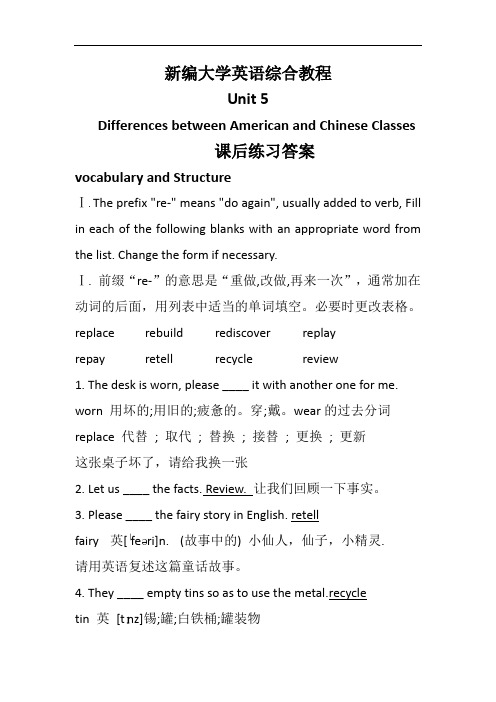
新编大学英语综合教程Unit 5Differences between American and Chinese Classes课后练习答案vocabulary and StructureⅠ. The prefix "re-" means "do again", usually added to verb, Fill in each of the following blanks with an appropriate word from the list. Change the form if necessary.Ⅰ. 前缀“re-”的意思是“重做,改做,再来一次”,通常加在动词的后面,用列表中适当的单词填空。
必要时更改表格。
replace rebuild rediscover replayrepay retell recycle review1. The desk is worn, please ____ it with another one for me. worn 用坏的;用旧的;疲惫的。
穿;戴。
wear的过去分词replace 代替; 取代; 替换; 接替; 更换; 更新这张桌子坏了,请给我换一张2. Let us ____ the facts. Review. 让我们回顾一下事实。
3. Please ____ the fairy story in English. retellfairy 英[ˈfeəri]n. (故事中的) 小仙人,仙子,小精灵.请用英语复述这篇童话故事。
4. They ____ empty tins so as to use the metal.recycletin 英[tɪnz]锡;罐;白铁桶;罐装物metal 英[ˈmetl]n.金属v.用金属做;用金属包;用碎石筑(路)。
他们回收空罐头盒以利用其金属。
5. He ____ the tape so that we can understand more clearly. replay 重赛;重放。
应用型大学英语视听说教程提高篇2 第五版 Unit5 Culture in Business

Part Two Listening
Listening
Listen to the passage, and complete the summary.
Theme: a bright future: cultural and creative products
Statement: With its creative products, the Palace Museum 1__a_tt_r_a_c_te_d__a_l_o_t_o_f__cu.stomers and visitors Reasons: Secret of success: as orientation and developed 2 _m__o_re__p_r_a_c_ti_c_a_l_p_r_o_d.ucts
Script
Part Two Listening
Listening Skill
记听力笔记技巧:格式与结构 做听力笔记时,我们不可能记下听到的所有信息。那么,怎样才能记下尽可能多的信息呢? 首先我们应该掌握所听信息的格式与结构。 听力任务通常组织得很有逻辑。大部分情况下,听力材料以说明开始,之后是几个例子或 者详细阐述,最后以结论收尾。如果我们关注到标志内部逻辑的词语(比如表示过渡的词语或 表示因果关系的词语),那么记录信息将会变得更容易。只要在逻辑上我们能够理解所听到的 内容,那么就可以重新组织记录下的信息片段,最后完成理解练习。比如,当你听到下面一段 文字时 : “Firstly, let’s talk a little bit about some of the components that go into online education. The first component is that... The second and perhaps one of the biggest components of our online education is that... The third component is that...”,我们需要特别关注文中的 “firstly” “the first component” “the second component”“the third component” 这些显示逻辑顺序的词语。关注这些 词语有助于我们在逻辑上更好地抓住重点 ,理解听力材料的内容。
全新版大学英语综合教程第二册 UNIT5
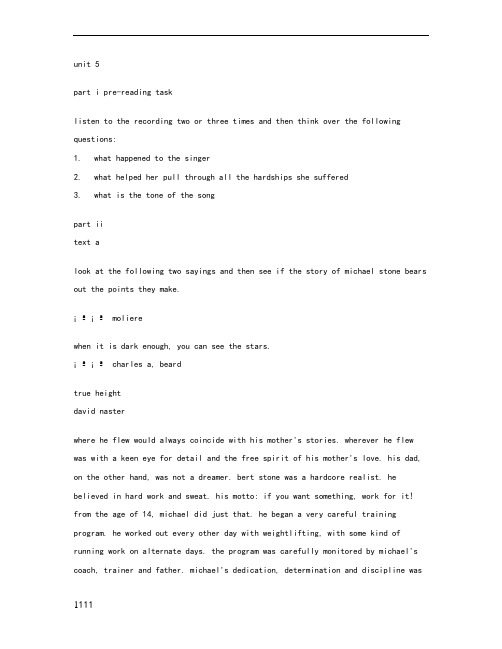
unit 5part i pre-reading tasklisten to the recording two or three times and then think over the following questions:1.what happened to the singer2.what helped her pull through all the hardships she suffered3.what is the tone of the songpart iitext alook at the following two sayings and then see if the story of michael stone bears out the points they make.¡ª¡ª molierewhen it is dark enough, you can see the stars.¡ª¡ª charles a, beardtrue heightdavid nasterwhere he flew would always coincide with his mother's stories. wherever he flew was with a keen eye for detail and the free spirit of his mother's love. his dad, on the other hand, was not a dreamer. bert stone was a hardcore realist. he believed in hard work and sweat. his motto: if you want something, work for it! from the age of 14, michael did just that. he began a very careful training program. he worked out every other day with weightlifting, with some kind of running work on alternate days. the program was carefully monitored by michael's coach, trainer and father. michael's dedication, determination and discipline wasa coach's dream. besides being an honor student and only child, michael stone continued to help his parents with their farm chores. mildred stone, michael's mother, wished he could relax a bit more and be that "free dreaming" little boy.on one occasion she attempted to talk to him and his father about this, but hisdad quickly interrupted, smiled and said, "you want something, work for it!"when michael cleared the bar at 17 feet 2 inches and 17 feet 4 inches, again he showed no emotion. as he lay on his back and heard the crowd groan, he knew the other vaulter had missed his final jump. he knew it was time for his final jump. since the other vaulter had fewer misses, michael needed to clear this vault to win. a miss would get him second place. nothing to be ashamed of, but michaelwould not allow himself the thought of not winning first place.he rolled over and did his routine of three finger-tipped push-ups. he found his pole, stood and stepped on the runway that led to the most challenging event ofhis 17-year-old life.the runway felt different this time. it startled him for a brief moment. then itall hit him like a wet bale of hay. the bar was set at nine inches higher than his personal best. that's only one inch off the national record, he thought. the intensity of the moment filled his mind with anxiety. he began shaking the tension. it wasn't working. he became more tense. why was this happening to him now, he thought. he began to get nervous. afraid would be a more accurate description.what was he going to do he had never experienced these feelings. then out of nowhere, and from the deepest depths of his soul, he pictured his mother. why now what was his mother doing in his thoughts at a time like this it was simple. his mother always used to tell him when you felt tense, anxious or even scared, take deep breaths.so he did. along with shaking the tension from his legs, he gently laid his poleat his feet. he began to stretch out his arms and upper body. the light breezethat was once there was now gone. he carefully picked up his pole. he felt hisheart pounding. he was sure the crowd did, too. the silence was deafening. when he heard the singing of some distant birds in flight, he knew it was his time to fly. as he began sprinting down the runway, something felt wonderfully different, yet familiar. the surface below him felt like the country road he used to dream about. visions of the golden wheat fields seemed to fill his thoughts. when he took a deep breath, it happened. he began to fly. his take-off was effortless. michael stone was now flying, just like in his childhood dreams. only this time he knew he wasn't dreaming. this was real. everything seemed to be moving in slow motion. the air around him was the purest and freshest he had ever sensed. michael was soaring like an eagle.with all the media attention and sponsorship possibilities, michael's life would never be the same again. it wasn't just because he won the national junior olympics and set a new world record. and it wasn't because he had just increased his personal best by 9 l/2 inches. it was simply because michael stone is blind. (1170 words)new words and expressionsbear outprove that (sth.) is true ֤ʵsweatvi. ³öº¹n. º¹Ë®toweln. ë½í£¬ÊÖ½ípole-vaultvi., n. ³Å¸ÍÌø¸ßvaultn. ³Å¸ÍÌø¸ß (=pole vault)£»³ÅÎïÌøÔ¾gracen. quality of being smooth and elegant, esp. in movement or structure ÓÅÃÀ£¬ÓÅÑÅ£»ÑÅÖÂgymnastn. Ìå²Ù¼Ò£¬Ìå²ÙÔ˶¯Ô±body buildern. ½¡ÃÀÔ˶¯Ô±merea.nothing more than ½ö½ö£¬Ö»²»¹ýfantasyn. »ÃÏënumerousa.very many Ðí¶àµÄ£¬ÎÞÊýµÄpassionn. strong feeling, esp. of love ÈÈÇédetailn. small, particular fact or item ϸ½Ú£¬ËöËéµÄÊÂrecur¡øoutrun (outran, outrun)vt. run faster or better than; go beyondÅܵñȡ¿ì£»ÅܵñȡºÃ£»³¬¹ýeaglen. Ó¥coincide¡øvi. happen at the same time; be in agreement ͬʱ·¢Éú£»Ò»ÖÂcoincide withÓë¡Í¬Ê±·¢Éú£»Óë¡Ò»ÖÂhard-corea.Íç¹Ì²»»¯µÄcoren. the most important part ºËÐÄrealistn. a person who deals in a practical way with situations as they actually are ÏÖʵÖ÷ÒåÕßmotton. ¸ñÑÔ£¬×ùÓÒÃúwork outgo through a physical exercise session ÌåÓý¶ÍÁ¶£¬ÑµÁ·weightliftingn. ¾ÙÖØ£¨Ô˶¯£©alteinate¡øa.every other or second; happening by turns ½»ÌæµÄ£»ÂÖÁ÷µÄcoachn. £¨ÌåÓýÔ˶¯µÄ£©½ÌÁ·dedicationn. giving oneself, time, effort, etc. (to sth.) ·îÏ×£¬Ï×Éídedicate¡øvt. Ï×ÉíÓÚ£¬ÖÂÁ¦ÓÚchoren. ¼ÒÍ¥ÔÓÎñrelaxon one/two/several occasion(s)ÓÐÒ»£¨Á½£¬¼¸£©´Îvaina.too pleased with one's own abilities or looks ÐéÈٵģ¬×Ô¸ºµÄbarn. ºá¸Ë£»Ìõ£»¿éinflatev. fill (sth.) with air £¨Ê¹£©³äÆø£¬£¨Ê¹£©ÅòÕÍmatn. µæ×Ó£»Ï¯×Ón. ¾ºÕùÕߣ¬¶ÔÊÖemotionn. Çé¸Ð£¬¸ÐÇépreparationn. the act or process of preparing ×¼±¸be ashamed offinger-tippeding or operated by the fingers ÓÃÊÖµÄpush-upn. (ame) ¸©ÎÔ³Årunwayn. ÅܵÀstartle¡øvt. give a sudden shock or surprise to ʹ´ó³ÔÒ»¾ªbalen. £¨Ò»£©´óÀ¦£¬£¨Ò»£©´ó°ühayn. ¸É²Ýintensityn. the state of being intense Ç¿ÁÒ¡¢¾çÁÒ£¬½ôÕÅanxietyn. a feeling of worry or fear ÓÇÂÇ£¬µ£ÐÄtensionn. worry or nervousness ½ôÕÅ£¬²»°²tensea.feeling worried or nervous; making people worried or nervous½ôÕŵģ»ÁîÈ˽ôÕŵÄalong withtogether with Á¬Í¬stretch outÉìÕ¹breezen. ΢·ç£¬Çá·çdeafenvt. make (sb.) unable to hear, esp. for a short time ʹÁûdeafa.unable to hear at all or to hear well ¶úÁûµÄsprintvi. run at one's fastest speed, esp. for a short distance ¼²ÅÜtake-offn. ÆðÌø£»£¨·É»ú£©Æð·Éeffortlessa.needing little or no effort ÈÝÒ׵ģ¬²»·ÑÁ¦ÆøµÄeruptionn. ±¬·¢erupt¡ø vi.thumpn. (noise made by) a heavy blow ÖØ»÷£¨Éù£©bring (sb.) back to earthʹ»Øµ½ÏÖʵÖÐin one's mind's eyeÔÚÏëÏóÖÐcongratulatevt. ×£ºØmedian. ´óÖÚ´«²¥Ã½½ésponsorshipn. ×ÊÖú£»ÔÞÖúproper namesdavid naster´óÎÀ¡¤ÄÉÊ·ÌØthe olympics = olympic games °ÂÁÖÆ¥¿ËÔ˶¯»ámichaelÂõ¿Ë¶û£¨ÄÐ×ÓÃû£©bert²®ÌØ£¨ÄÐ×ÓÃû£¬albert, herbert, bertramµÄêdzƣ¬Òà×÷burt£©mildredÃ׶ûµÂÀïµÂ£¨Å®×ÓÃû£©language sense enhancement1.read aloud paragraphs 9-10 and learn them by heart.2.read aloud the following poem written by the american deaf-blind writer andeducationist, helen keller (1880-1968).facing fatehelen kellersecurity is mostly a superstition.it does not exist in nature,nor do the children or men as a whole experience it.avoiding danger is no safer in the long runthan outright exposure.life is either a daring adventure, or nothing.to keep our faces toward change andbehave like free spiritsin the presence of fate is strength undefeatable.3.read the following quotations. learn them by heart if you can. you might needto look up new words in a dictionary.¡ª¡ª helen kellerno pain, no palm; no thorns, no throne; no gall, no glory; no cross, no crown.¡ª¡ª william pennall rising to great place is by a winding stair.¡ª¡ªfrancis baconif we face our tasks with the resolution to solve them, who shall say that anything is impossible.¡ª¡ª wilfred grenfell4.read the following humorous story for fun. you might need to look up newwords in a dictionary." dear brother, how delightful to join you in prayer when only a moment ago i feared for my life," the missionary said." don't interrupt," said the lion, "i'm just saying grace."11111111。
大学英语精读第3册UNIT5课文翻译及课后答案
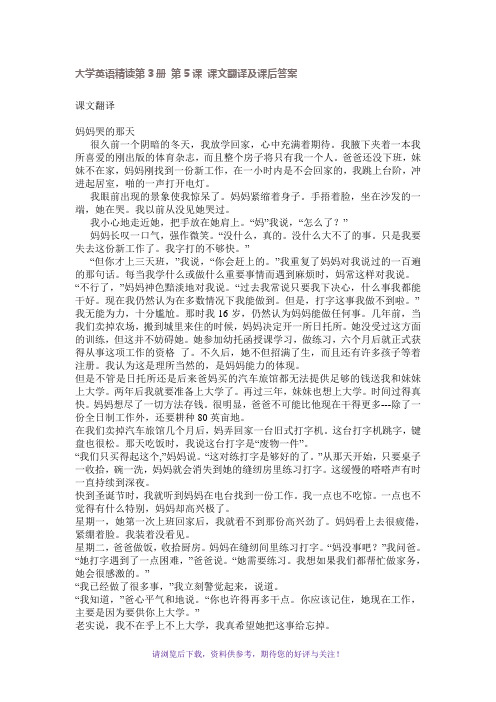
大学英语精读第3册第5课课文翻译及课后答案课文翻译妈妈哭的那天很久前一个阴暗的冬天,我放学回家,心中充满着期待。
我腋下夹着一本我所喜爱的刚出版的体育杂志,而且整个房子将只有我一个人。
爸爸还没下班,妹妹不在家,妈妈刚找到一份新工作,在一小时内是不会回家的,我跳上台阶,冲进起居室,啪的一声打开电灯。
我眼前出现的景象使我惊呆了。
妈妈紧缩着身子。
手捂着脸,坐在沙发的一端,她在哭。
我以前从没见她哭过。
我小心地走近她,把手放在她肩上。
“妈”我说,“怎么了?”妈妈长叹一口气,强作微笑。
“没什么,真的。
没什么大不了的事。
只是我要失去这份新工作了。
我字打的不够快。
”“但你才上三天班,”我说,“你会赶上的。
”我重复了妈妈对我说过的一百遍的那句话。
每当我学什么或做什么重要事情而遇到麻烦时,妈常这样对我说。
“不行了,”妈妈神色黯淡地对我说。
“过去我常说只要我下决心,什么事我都能干好。
现在我仍然认为在多数情况下我能做到。
但是,打字这事我做不到啦。
”我无能为力,十分尴尬。
那时我16岁,仍然认为妈妈能做任何事。
几年前,当我们卖掉农场,搬到城里来住的时候,妈妈决定开一所日托所。
她没受过这方面的训练,但这并不妨碍她。
她参加幼托函授课学习,做练习,六个月后就正式获得从事这项工作的资格了。
不久后,她不但招满了生,而且还有许多孩子等着注册。
我认为这是理所当然的,是妈妈能力的体现。
但是不管是日托所还是后来爸妈买的汽车旅馆都无法提供足够的钱送我和妹妹上大学。
两年后我就要准备上大学了。
再过三年,妹妹也想上大学。
时间过得真快。
妈妈想尽了一切方法存钱。
很明显,爸爸不可能比他现在干得更多---除了一份全日制工作外,还要耕种80英亩地。
在我们卖掉汽车旅馆几个月后,妈弄回家一台旧式打字机。
这台打字机跳字,键盘也很松。
那天吃饭时,我说这台打字是“废物一件”。
“我们只买得起这个,”妈妈说。
“这对练打字是够好的了。
”从那天开始,只要桌子一收拾,碗一洗,妈妈就会消失到她的缝纫房里练习打字。
新编大学英语视听说Unit5答案
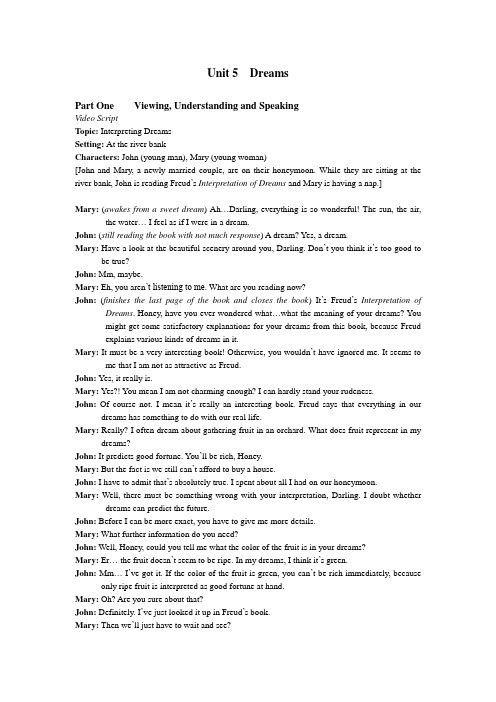
Unit 5 DreamsPart One Viewing, Understanding and SpeakingVideo ScriptTopic: Interpreting DreamsSetting: At the river bankCharacters: John (young man), Mary (young woman)[John and Mary, a newly married couple, are on their honeymoon. While they are sitting at the river bank, John is reading Freud’s Interpretation of Dreams and Mary is having a nap.]Mary: (awakes from a sweet dream) Ah…Darling, everything is so wonderful! The sun, the air, the water… I feel as if I were in a dream.John: (still reading the book with not much response) A dream? Yes, a dream.Mary: Have a look at the beautiful scenery around you, Darling. Don’t you think it’s too good to be true?John: Mm, maybe.Mary: Eh, you aren’t listening to me. What are you reading now?John: (finishes the last page of the book and closes the book) It’s Freud’s Interpretation of Dreams. Honey, have you ever wondered what…what the meaning of your dreams? You might get some satisfactory explanations for your dreams from this book, because Freud explains various kinds of dreams in it.Mary: It must be a very interesting book! Otherwise, you wouldn’t have ignored me. It seems to me that I am not as attractive as Freud.John: Yes, it really is.Mary: Yes?! You mean I am not charming enough? I can hardly stand your rudeness.John: Of course not. I mean it’s really an interesting book. Freud says that everything in our dreams has something to do with our real life.Mary: Really? I often dream about gathering fruit in an orchard. What does fruit represent in my dreams?John: It predicts good fortune. You’ll be rich, Honey.Mary: But the fact is we still can’t afford to buy a house.John: I have to admit that’s absolutely true. I spent about all I had on our honeymoon.Mary: Well, there must be something wrong with your interpretation, Darling. I doubt whether dreams can predict the future.John: Before I can be more exact, you have to give me more details.Mary: What further information do you need?John: Well, Honey, could you tell me what the color of the fruit is in your dreams?Mary: Er… the fruit doesn’t seem to be ripe. In my dreams, I think it’s green.John: Mm…I’ve got it. If the color of the fruit is green, you can’t be rich immediately, because only ripe fruit is interpreted as good fortune at hand.Mary: Oh? Are you sure about that?John: Definitely. I’ve just looked it up in Freud’s book.Mary: Then we’ll just have to wait and see?John: That’s right, Honey. Do you have any other happy dreams?Mary: Yes. I had another one just now. It was so sweet that I smiled from ear to ear. Would you like to have another try, Mr. Freud?John: I t’s my pleasure, madam. What happened in this dream? I guarantee you I can give you another good explanation.Mary: When I was dozing, I dreamed that you gave me a beautiful diamond necklace as a memento of our wonderful honeymoon. What do you think that means?John: (understands her wife’s actual intention and tries to find a way out) Er…Er…I’m not sure.Er…maybe I’m… I’m not knowledgeable enough! But anyway I can turn to the book for help. Wait a minute!Mary: Take it easy, Darling! I’m sure you know how you can make it come true.John: Too bad!Mary: What’s wrong?John: (smiles cunningly at his wife) I’m afraid Freud didn’t tell me how to interpret a daydream, only dreams at night.Mary: Daydream?!John: Yes, it must be a daydream since you had it during the day.Exercise 1Directions: You’re going to watch a video in which a couple talk about dreams. Read the following part carefully, which will make it easy for you to understand the video.Exercise 2Directions: Now watch the video and choose the best answer to each of the following questions. Key to Exercise 2: 1) B 2) A 3) C 4) CExercise 3Directions: Watch the video again and fill in the missing words in the incomplete lines of the speakers’.Key to Exercise 3:1) too good to be true2) various kinds3) ignored4) stand5) has something to do with6) dream about7) can’t afford to8) something wrong with9) ripe, at hand10) come trueExercise 4Directions: Watch the video a third time. This time you are required to repeat a few important lines. What you have said will be recorded so that you can compare yourpronunciation and intonation with the speakers’. Try to imitate their pronunciationand intonation.Exercise 5Directions: Now you know how dreams are interpreted in the video. Please describe one of your dreams to your partner. Your description will be recorded so that your teacher will beable to know your performance. If you want to improve your work, try again beforeyou submit your recording.Part Two Listening, Understanding and SpeakingListening IWords You Need to Know:passive 被动的at rest 休息process 变化过程inactive 不活跃的stage 阶段still 静止不动的alternate 轮流, 交替cycle 循环TapescriptLet’s look at the different kinds of sleep. They’re quite different. In passive sleep, the body is at rest. The heart slows down. The body processes become very slow. We move very little, and the brain becomes very inactive. If a person continues to sleep, she or he enters a new stage, a more active stage. The body goes through several changes: the brain temperature rises, the amount of blood in the brain increases, the body becomes very, very still, and the brain goes from being very inactive to being active. And as the brain becomes more active, the eyes begin to move rapidly. Eye movement is a sign of another change—that of a person dreaming.Throughout the night, people alternate between passive and active sleep. The brain rests, then it becomes active, then dreaming occurs. This cycle is repeated several times throughout the night. During eight hours of sleep, people dream for a total of one and a half hours on the average.Doctors have studied the sleep cycle and have found that everyone dreams—in fact, everyone needs to dream in order to stay healthy. It appears we need both kinds of sleep. We need passive sleep in order to rest our bodies. We need active sleep in order to dream. And dreaming helps us to rest our minds. (222 words)Exercise 1(Online)Directions:Listen to the passage and choose the best answer to each of the following questions. Key to Exercise 1: 1) B 2) A 3) C 4) D 5) B 6) CExercise 2 (Online)Directions:Listen to the passage again and complete the following table using what you hear on the recording. Check the answers with your partner.Listening IIWords You Need to Know:interviewer采访者nightmare噩梦steep陡峭的scared恐惧的trapped被困的an intensive Italian course一门意大利语强化课psychoanalyst心理分析医生Los Angeles 洛杉矶(地名) therapy治疗interpret 解释symbol 象征classic 经典的TapescriptJ = Jennifer I = InterviewerPart I(Jennifer is talking to an interviewer about her nightmare.)J: It was always the same. Always. I was in a house, a strange house, and I knew somehow that I shouldn’t have gone in. But there was some strange force pulling me. There were some stairs… very steep stairs… and I started to climb them, and… and then, suddenly I fell. Then when I was at the bottom of the stairs, I suddenly realized that there was someone… or something else in the house with me, and that these eyes had been watching me all the time, and… I knew then that something terrible… was going to happen to me… that I was going to be punished… because I’d done something I shouldn’t have done. I didn’t know what it was I’d done, only that it was wrong, very wrong.Then I could hear it… whatever it was in the house with me… coming closer in the darkness, because everything was dark, you see… and it came closer and closer. And I was scared… and there was nothing, nothing I could do to avoid it… nothing. I was trapped! Trapped in that dark house at the bottom of the stairs. There was no way out.I: And how often…J: No way out!Part IIExercise 1 (Online)Directions: You are going to hear an interview about Jennifer’s nightmare. Listen to Par t I and put a tick (√) next to each statement that describes her nightmare.Key to Exercise 1:√for 1), 3), 5), 6), 7) & 8)Exercise 2 (Online)Directions: Listen to Part II and choose the best answer to each of the following questions.Key to Exercise 2: 1) A 2) C 3) D 4) BExercise 3(Online)Directions: Listen to the whole interview again and fill in the missing words in the following summary.Key to Exercise 3:1) strange 2) strange force 3) very steep 4) at the bottom 5) watching 6) be punished7) in the darkness 8) scared 9) avoid 10) exam 11) interpreting dreams 12) disappointing 13) making mistakes 14) symbolExercise 4Directions:Listen to the whole interview again and discuss the following questions in groups.1) What do you think was the cause of Jennifer’s nightmare?2) Have you ever had nightmares? If you do, describe one of them to your classmates. If not, try toexplain why your classmates have had nightmares.Samples:Part Three More ListeningPractice One SleepWords You Need to Know:zoologist 动物学家primitive 原始的snail 蜗牛exceptional 例外的pre-determined 预先决定的subconscious潜意识的ancestor 祖先TapescriptSleep is something we generally associate with living creatures. Of course, it is true that a lot of animals sleep, but zoologists are not certain that primitive forms of animal life, like worms and snails, ever really sleep. On the other hand, animals such as bears sleep for 4 or 5 months every year.The amount of sleep a human being needs depends on age, the individual and possibly race. For example, doctors think that pre-school children need between 10 and 12 hours a night; school children between 9 and 11 hours; and adults between 7 and 9 hours. There are exceptional cases of old people who sleep only between 2 and 3 hours a day and continue to be active and healthy. The sleep requirements of different races also appear to be different. Japanese people, for example, sleep fewer hours than Europeans.It is not known for certain if mental activity (apart from dreaming) occurs when a person is asleep. However, it is certainly true that some people can wake up at a specific, pre-determined time. There are also stories about mathematicians who solve difficult problems during sleep, because their subconscious minds continue working on the problem.Some types of unpleasant dreams (or “nightmares”) are quite common; the dreamer is taking a test, but is not properly prepared; he is falling from a tree; or an animal or thing is chasing him.Some people say these last two occur because man’s ancestors lived in trees and were in constant danger from wild animals. (254 words)Exercise 1(Online)Directions: Listen to the passage about sleep and dreams. Then choose the best answer to each of the following questions.Key to Exercise 1: 1) D 2) C 3) B 4) DExercise 2 (Online)Directions: Listen to the passage again and decide whether the following statements are true or false. Put “T” for true and “F” for false in the space provided.Key to Exercise 2: 1) T 2) F 3) T 4) F 5) F 6) TPractice Two A Dream within a DreamWords You Need to Know:brow 额avow 承认deem 认为amid 在……中roar 轰鸣声surf 海浪torment 折磨Background Information:Edgar Allan Poe (埃德加.爱伦.坡) (1809—1849) was a US poet and writer of short stories. He is most famous for his strange, frightening stories about death and evil powers such as The Fall of the House of Usher. Another story, The Murders in the Rue Morgue (莫格街凶杀案), is one of the first detective stories. His most famous poem is The Raven (乌鸦).TapescriptA Dream within a Dreamby Edgar Allan PoeTake this kiss upon the brow!And, in parting from you now,Thus much let me avow --You are not wrong, who deemThat my days have been a dream;Yet if hope has flown awayIn a night, or in a day,In a vision, or in none,Is it therefore the less gone?All that we see or seemIs but a dream within a dream.I stand amid the roarOf a surf-tormented shore,And I hold within my handGrains of the golden sand --How few! yet how they creepThrough my fingers to the deep,While I weep -- while I weep!O God! can I not graspThem with a tighter clasp?O God! can I not saveOne from the pitiless wave?Is all that we see or seemBut a dream within a dream.Exercise(Online)Directions:Listen to the poem “A Dream within a Dream” twice and fill in each blank with the word you hear.Key to the exercise:1) parting 2) wrong 3) dream 4) night 5) none 6) seem 7) shore 8) sand9) fingers 10) grasp 11) save 12) wavePractice Three DaydreamsWords You Need to Know:fantasize 幻想abnormal 不正常的inherit 遗传divert 转移alert 警觉的TapescriptAlmost all people daydream during a normal day. We tend to daydream the most during those quiet times when we are alone in our cars, sitting in waiting rooms, or preparing for bed. Daydreaming or fantasizing is not abnormal; it is a basic human characteristic. Most people have reported that they enjoy their daydreams. Some people have very probable and realistic daydreams while others have unrealistic fantasies such as inheriting a million dollars.Psychologists report that men daydream as much as women, but the subject of their daydreams or fantasies is different. Men daydream more about being heroes and good athletes while women tend to daydream about fashions and beauty. As people grow older, they tend to fantasize less, although it is still common in old age. Older people tend to daydream a lot about the past. Daydreaming or fantasizing enters into the games of children. Psychologists believe that it is very important for children to participate in fantasy play. It is a normal part of their development. It helps children develop and explore their imagination.Daydreaming has advantages and disadvantages. In some situations it can reduce a person’s fear or anxiety. It can also keep us entertained or awake under dull or boring conditions. Unfortunately, to engage in a daydream or fantasy, we must divert part of our attention from our environment. When it is important for us to remain alert and pay attention to what is going on around us, daydreaming can cause problems. (246 words)Exercise 1 (Online)Directions: Listen to the passage about daydreams, then decide which of the following questions are answered in the passage. Write “Yes” beside those answered, and “No” besidethose unanswered.Key to Exercise 1:“Yes” for 2), 3)& 6), “No” for 1), 4) & 5)Exercise 2 (Online)Directions: Listen to the passage again, and choose the best answer to each of the following questions.Key to Exercise 2: 1) A 2) C 3) B 4) C 5) A 6) CPractice Four What Do People Dream about?Words You Need to Know:distorted 扭曲的conflict 冲突conditioning 影响monster 妖怪hostile 敌对的aggression 进攻depressed 沮丧的victim 受害人rejection拒绝Naomi Epel (人名)subconscious 潜意识TapescriptNew research shows that dreams are often distorted reflections of our daily life. Many experts now believe our dreams are so closely related to our waking lives that we can use them to help us recognize our inner conflicts.According to some experts, men and women dream differently because of biological and social conditioning. In a study of 1000 dreams, half from each sex, experts found that men more often have action dreams. Usually these dreams are set outdoors or in unfamiliar surroundings. Women dream more of emotional struggles with loved ones, usually in indoor settings. As more women have care ers, their dreams might become more like men’s. Researchers have found that while housewives dream more about children, women in the workplace dream about bosses and colleagues. Small children who are easily scared dream of frightening animals and monsters that chase and attack them. Teenagers dream of romance and sex.Some dream researchers found in a study that people between 21 and 34 have more anxiety over issues of right and wrong in their dreams, possibly because they are making important decisions about career, marriage and life direction. People of ages 35 to 49 are much less hostile toward others in their dreams, perhaps because they’re reaching their greatest achievement, and have less need for aggression while awake. After age 65, anxiety about aging appears much more often in people’s dreams.If life stages affect our dreams, so do our attitudes. Studies show that angry people act out their anger in their dreams, and depressed people sometimes dream they are victims of rejection.Creative people often use their dreams to solve problems. According to author Naomi Epel, when some writers, artists or scientists go to sleep, they ask their subconscious for a dream that will help them solve problems. (299 words)Exercise 1 (Online)Directions: Listen to the passage on what people dream about and match each kind of person with the dream they are more likely to have. Write the corresponding letter on the linebeside the number. There are more dreams than people.Key to Exercise 1: 1) C 2) A 3) I 4) H 5) F 6) D 7) J 8) GExercise 2Directions: Listen to the passage again and answer the following questions or complete the sentences with as few words as possible.Key to Exercise 2:1) Because dreams are closely related to waking lives.2) more women have careers3) They are making important decisions about career, marriage and life direction.4) solve problems5) Life experiences, life stages and attitudes.Part Four Testing YourselfSection IBuried AliveTapescriptIn 1865, in a small town in Germany, a little boy was very sick. His name was Max Hoffman.“Will our son die?” Max’s parents asked the doctor.“Maybe,” the doctor said quietly. “Stay with Max. Keep him warm. That’s all you can do.”For three days Max lay in his bed. Then he died. He was only five years old.Max’s parents buried their son in the town cemetery. That night Max’s mother had a terrible dream. She dreamed that Max was moving in his coffin. She screamed in her sleep.“Sh, sh,” her husband said. “It’s all right. You had a bad dream.”The next night Max’s mother screamed in her sleep again. She had the same terrible dream.On the third night Max’s mother had another bad dream. She dreamed that Max was crying. She got out of bed and got dressed. “Quick! Get dressed,” she told her husband. “We’re going to the cemetery. I want to see Max. I want to dig up his coffin.”At four o’clock in the morning Max’s parents and a neighbor hurried to the cemetery. They dug up Max’s coffin and opened it. There was Max. He looked dead. But he wasn’t lying on his back. He was lying on his side.Max’s father carried Max home. Then he ran to get the doctor. For an hour the doctor rubbed whiskey on Max’s lip and warmed his body. Then Max opened his eyes. Max was alive! A week later he was playing with his friends.Max Hoffman died—really died—in the United States in 1953. He was 93 years old.(270 words) Part ADirections: Listen to the passage and rearrange the following sentences in chronological order.Write the numbers in the spaces provided. (16 points)Key to Part A: 1) E 2) G 3) D 4) A 5) F 6) C 7) H 8) BPart BDirections: Listen to the passage again and choose the best answer to each of the following questions. (14 points)Key to Part B: 1) C 2) A 3) B 4) D 5) B 6) D 7) CSection IIVideo ViolenceTapescriptA couple is talking about their 8-year-old daughter, Debbie. They also have a son, Barry, who is16.Mother: I had to go in to Debbie twice last night. She was having these terrible nightmares! She was screaming and shouting and she kept trying to push me away. She was yelling, “Don’t hurt me! Don’t hurt me!”Father: What was wrong with her then?Mother:I don’t know. I couldn’t get a word out of her when she woke up this morning. Father:Does Barry know anything about it? Didn’t she go with him to his friend’s house yesterday afternoon? Wait a minute, I’ll give him a shout. Barry! Come here, Will you? Barry:What’s up?Father:Didn’t you say you were going to watch a film on your friend’s video yesterday? Barry: Yes, I told you! You said it was O.K.Mother:Well, what exactly did you watch? Debbie’s been having the most terrible nightmares. Barry:Oh, I don’t know! Some film his Dad had left ly ing around. About a man who had been burned to death in a car crash, who came back from the dead to take revenge on young girls. He tears them to bits and eats them. It was a young girl, see, who ran in front of his car an d made him crash. Don’t know why it’s giving her nightmares. It was really stupid, if you ask me! Anyway, she didn’t have to watch it, did she?Mother: You should have more sense at your age. You should have stopped her watching it. Father: I blame the pe ople who make films like that. They shouldn’t be allowed to make them.They must be really sick! All they care about is making money—they don’t care what they are doing to kids’ minds. (282 words)Part ADirections: Listen to the dialogue in which three people are talking about video violence. Then decide whether the following statements are true or false. Put “T” for true and “F”for false in the space provided. (12 points)Key to Part A: 1) T 2) F 3) F 4) T 5) F 6) TPart BDirections: Listen to the dialogue again and complete the following summary by filling in each blank with the exact word you hear. (32 points)Key to Part B:1) pushing 2) away 3) friend’s house 4) burned to death 5) the dead6) in front of 7) kids’ minds 8) making moneySection IIIInterpretation of a DreamTapescriptDear Editor,Your paper is great. I read with great interest your interpretation on dreams of teeth falling out. It is the same interpretation that many others use as well (needing to be heard etc). I myself had this dream repeatedly and was dying to know what it meant, as it was always confusing and disturbing. However, I was always unsatisfied with the “needing to be heard” thing.You might note that many people who have this dream are feeling worried, depressed or frightened as their teeth are falling out painlessly. Sometimes they even try to keep the teeth from falling out. Finally I came up with a different interpretation, which fitted much better for me. In fact, I’ve had fewer dreams of this sort now. So I thought you might be interested. For me, the dream means I am talking TOO MUCH. It means thoughtlessness, telling secrets, gossiping unwisely. And it’s my subconscious warning me. Now, if I have this dream, I know I have been unwise with my big mouth! Trying to cram the teeth back in, or stop them falling out, or trying to find a dentist, actually means trying to stop the words or gossip from coming out, and the feelings of depression are reflecting the regret of being too revealing—usually to an enemy. I am much more aware of this now and not such a big mouth! Maybe you could add this to your interpretations.BestKatie(243 words) Part ADirections: In this section, you’ll hear a letter to a newspaper column that provides interpretations of typical dreams regularly. Listen to the letter and choose the bestanswer to each of the following questions. (10 points)Key to Part A: 1) A 2) C 3) D 4) B 5) CPart BDirections: Listen to the letter again and decide which of the following statements are the woman’s own description or interpretation of the dream. Put “Y” for yes and “N” forno in the space provided. (16 points)Key to Part B: 1) Y 2) Y 3) N 4) Y 5) N 6) N 7) Y 8) Y。
